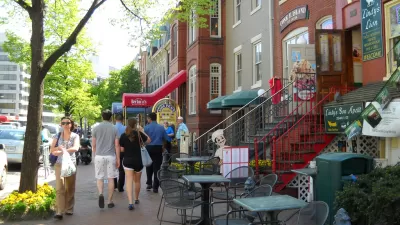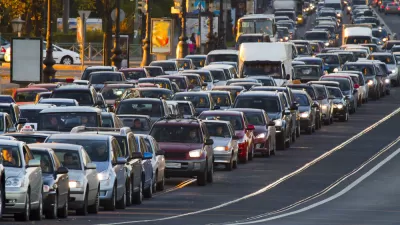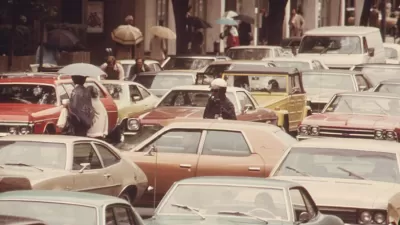Is there a relationship between carless households and density of college graduates? Derek Thompson of The Atlantic connected the dots using Michael Sivak's latest 'peak car' study and saw a relationship between the two variables.

"The members of the The Atlantic Business Channel (where Derek Thompson works as a senior editor) all live in New York City. At various points in our lives, we have all lived in Washington, D.C., too. And these two cities...happen to be the two metros with the highest share of non-car households in America, according to the University of Michigan’s Transportation Research Institute," writes Thompson.
When Thompson looked at the graph (located in the article) of the 30 cities showing which metros have the highest and lowest rates of "non-car households" (as well as the U.S. average), the first thing he thought of was not what the researcher told The Wall Street Journal:
The five cities with the highest proportions of households without a vehicle were all among the top five cities in a recent ranking of the quality of public transportation," said Michael Sivak, director of Sustainable Worldwide Transportation at Michigan.
"When I see New York, D.C., Boston, Philadelphia, San Francisco [the top-five, respectively, no-car households], the first thing I think is: These are all the classic, even cliche, magnets for elite college graduates," he wrote.
So I compared the cities' non-car ownership rates to their share of bachelor's-degree holders. And it turns out there is a statistically significant relationship between being college-dense and car-light. [Scroll across the interactive dot graph (under the aforementioned graph in article) that reveals "% no-car, % college"]
Thompson recognizes that "what we're looking at here is an underlying variable of city density. Highly productive cities that are magnets for talented (and rich) people tend to be crowded with twentysomethings trying to start their careers. Small crowded cities get clogged, and clogged cities require the kind of effective public transportation that makes cars an expensive nice-to-have rather than a have-to-have," he writes.
The theory doesn't appear to hold, though, for Austin and San Jose, the major city of Silicon Valley, ranked third-to-last and last, respectively, in the ranking of carless households.
Sivak's report, "Has Motorization in the U.S. Peaked? Part 4: Households without a Light-Duty Vehicle" [PDF] was discussed here and also in USA Today.
FULL STORY: Why Do the Smartest Cities Have the Smallest Share of Cars?

Alabama: Trump Terminates Settlements for Black Communities Harmed By Raw Sewage
Trump deemed the landmark civil rights agreement “illegal DEI and environmental justice policy.”

Study: Maui’s Plan to Convert Vacation Rentals to Long-Term Housing Could Cause Nearly $1 Billion Economic Loss
The plan would reduce visitor accommodation by 25% resulting in 1,900 jobs lost.

Planetizen Federal Action Tracker
A weekly monitor of how Trump’s orders and actions are impacting planners and planning in America.

Wind Energy on the Rise Despite Federal Policy Reversal
The Trump administration is revoking federal support for renewable energy, but demand for new projects continues unabated.

Passengers Flock to Caltrain After Electrification
The new electric trains are running faster and more reliably, leading to strong ridership growth on the Bay Area rail system.

Texas Churches Rally Behind ‘Yes in God’s Back Yard’ Legislation
Religious leaders want the state to reduce zoning regulations to streamline leasing church-owned land to housing developers.
Urban Design for Planners 1: Software Tools
This six-course series explores essential urban design concepts using open source software and equips planners with the tools they need to participate fully in the urban design process.
Planning for Universal Design
Learn the tools for implementing Universal Design in planning regulations.
Caltrans
Smith Gee Studio
Institute for Housing and Urban Development Studies (IHS)
City of Grandview
Harvard GSD Executive Education
Toledo-Lucas County Plan Commissions
Salt Lake City
NYU Wagner Graduate School of Public Service




























